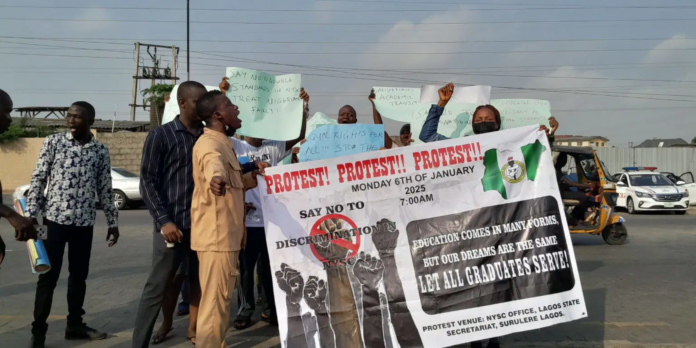In a dramatic show of defiance, hundreds of Higher National Diploma (HND) graduates took to the streets of Lagos on Monday, January 6, protesting against a proposed policy that excludes them from participating in the National Youth Service Corps (NYSC).
The demonstration coincided with the commencement of registration for the second stream of Batch C mobilisation, amplifying the urgency of their demands. Armed with placards bearing messages like “Say No To Discrimination in NYSC” and “Equal Rights for All,” the protesters converged on the NYSC secretariat in Lagos State, chanting slogans and voicing their grievances.
Protesters Demand Equal Rights
Leading the protest was Majaro Temitope, an HND graduate of Yaba College of Technology, who did not mince words in describing the policy as both unjust and discriminatory. He lamented that the policy unfairly targeted graduates who had transitioned from part-time National Diploma (ND) programmes to full-time HND studies.
“Many of us here did ND part-time and later switched to full-time HND. We were not told there is a policy that will deny us the opportunity to serve, despite the struggles we faced during our ND years,” Temitope explained passionately.
He further disclosed that efforts had been made to engage the authorities, but these had so far yielded no positive response.
“We have already written to the Director-General and JAMB regarding this issue. We hope the Federal Government and the Ministry of Education will review this unfair policy, especially now that registration has begun, and we are still unable to register,” he said.
Voices of Support
The protest also drew support from the Education Rights Campaign (ERC), a civil society organisation dedicated to championing educational reform in Nigeria. Representing the ERC, Adebola Osunfunrewa described the policy as a glaring symptom of the country’s ailing education system.
“This policy highlights the collapse of Nigeria’s education system. How can over 3,000 students be pleading for the opportunity to serve in a country that desperately needs teachers?” Osunfunrewa asked rhetorically.
He argued that the NYSC, which was originally designed to foster unity and provide a platform for young Nigerians to contribute to national development, was now being weaponised to deepen societal inequalities.
NYSC Management Responds
In response to the protesters, Lagos NYSC Coordinator, represented by Assistant Director Ehimuenma Itohan, assured the graduates that their concerns had reached the highest levels of the NYSC hierarchy.
“Your concerns have been noted and forwarded to the highest level of NYSC management. The Director-General is committed to addressing the concerns of the youth, and I assure you that this issue is being taken seriously and will be reviewed in accordance with existing policies,” Itohan said.
She pleaded for calm, urging the graduates to exercise patience as the NYSC leadership deliberated on their demands.
Background and Policy Context
The controversy stems from a recent NYSC directive that disqualifies HND graduates who previously completed part-time ND programmes from participating in the scheme. While the policy’s specifics remain unclear, its implications have sparked widespread outrage, particularly among affected students.
The NYSC, established in 1973, was envisioned as a tool for fostering national unity and providing Nigerian graduates with opportunities for personal and professional development. Over the years, however, the programme has faced criticism for perceived inefficiencies and exclusionary practices.
The exclusion of certain categories of HND graduates is seen by many as a continuation of policies that undermine the spirit of the scheme. Critics argue that the policy fails to account for the structural challenges of Nigeria’s education system, which often compels students to pursue part-time studies due to financial or institutional constraints.
Calls for Reform
For the protesters, the stakes are high. Beyond the immediate issue of NYSC exclusion, many see this policy as a broader indictment of the Nigerian government’s neglect of higher education.
“We worked hard to transition from part-time to full-time studies, and now we are being told that those efforts mean nothing. This is unfair, and it must change,” said another protester who identified herself as Aisha, an HND graduate from Moshood Abiola Polytechnic.
The ERC has also called on the Ministry of Education to intervene urgently. “This is not just about NYSC. It is about the future of education in Nigeria and the need to ensure that no student is left behind,” Osunfunrewa said.
Wider Implications
Observers have noted that the timing of the protests, coinciding with the start of Batch C registration, has put additional pressure on the NYSC to address the issue swiftly. With over 3,000 students reportedly affected, the protests could spread to other states if no resolution is reached.
Moreover, the controversy has reignited debates about the relevance of the NYSC in its current form. Some critics have called for a complete overhaul of the scheme to better reflect the realities of modern Nigeria.
Next Steps
As of now, the ball is in the court of the NYSC management and the Ministry of Education. While the Lagos NYSC Coordinator has expressed optimism that the matter will be resolved, protesters remain sceptical, insisting that only concrete action—not promises—will suffice.
“We will not back down until we see tangible results. This is our future, and we will fight for it,” said Temitope, reiterating the resolve of the graduates.
The protest underscores a growing sense of disillusionment among Nigerian youth, who increasingly feel alienated by policies that fail to account for their struggles and aspirations. For these graduates, the fight for NYSC inclusion is not just a battle against one policy but a broader struggle for equality and recognition in a system that often sidelines them.

